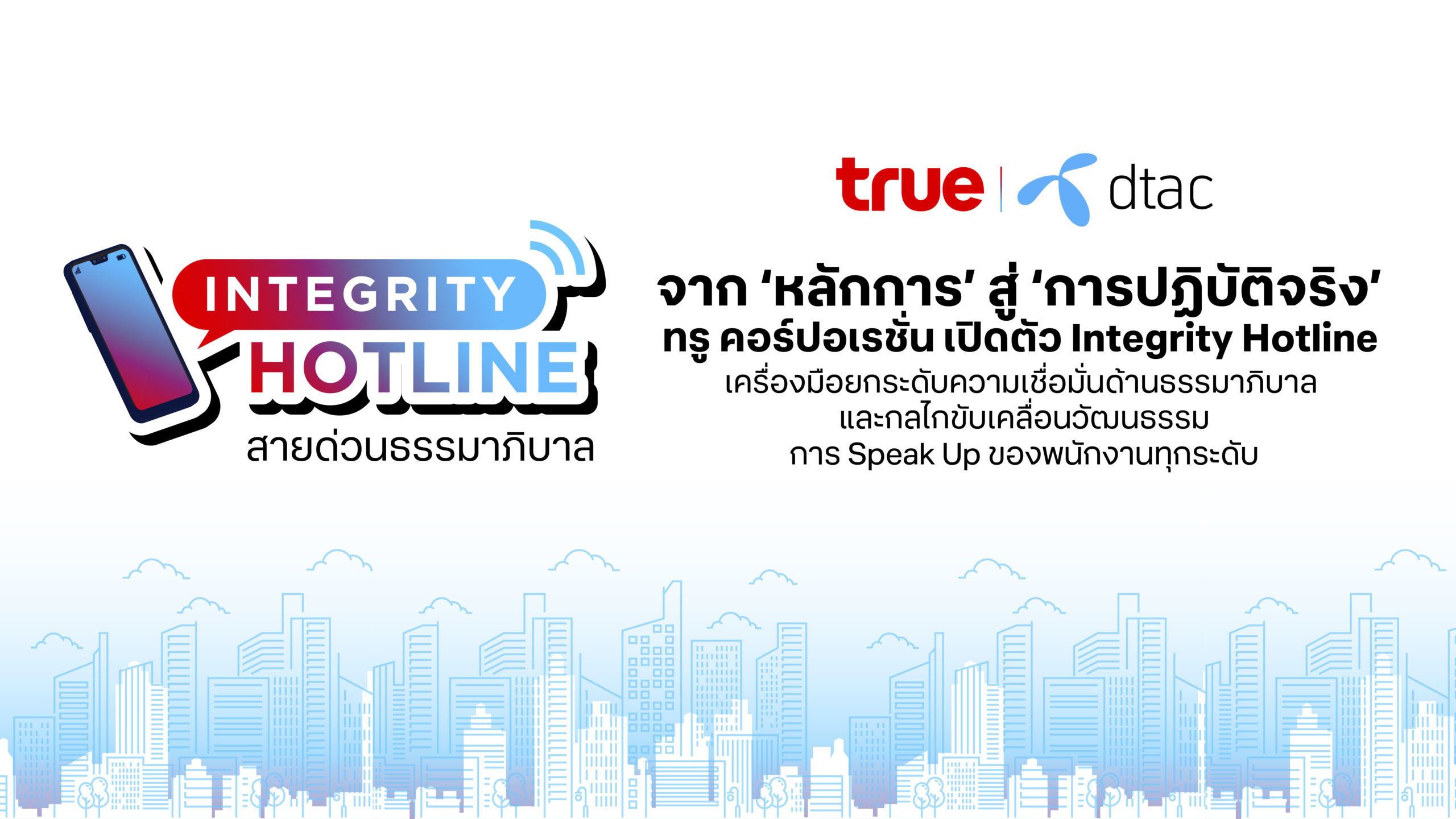According to a survey by a globally leading accounting firm, 97% of business leaders who participated in the survey recognize the importance of demonstrating their organization’s commitment to operating with integrity. In the current business environment, every individual within the organization, be it top management, board of directors, or employees at any level, assumes a vital role in managing governance risks and nurturing a strong organizational culture.
True Corporation has recently introduced the ‘integrity hotline’, a critical mechanism in addressing risks and uplifting the governance standards within the organization.
Fostering a Speak Up Culture
For businesses, maintaining integrity is not just a robust risk management strategy; it also serves as a significant predictor of future success. Upholding strong governance and ethical principles is vital in managing reputation, attracting top talents, and earning the trust of customers, employees, business partners, and society at large. However, operating with integrity demands a rigorous enforcement of rules and regulations, an effective risk management framework, and an organizational structure that fosters checks and balances.
After the amalgamation, True is fully committed to more comprehensive governance standards. As part of this commitment, the company has introduced the integrity hotline—an online platform that enables individuals to report any suspected behaviors or actions that violate the company’s Code of Conduct. The hotline is accessible to both employees and external parties, ensuring a transparent avenue to report any instances of wrongdoing or misconduct.
The integrity hotline serves as a crucial mechanism for the company to put its governance principles into action and cultivate a culture where employees at all levels feel confident and empowered to use the channel to speak up and report unethical behaviors.

Whistleblower Averts Crisis
An essential aspect of fostering a speak up culture and upholding good governance lies in ensuring trust and confidence for ‘whistleblowers,’ as they play a crucial role in preventing undesirable incidents and mitigating potential damages before they escalate into crises. Recent scandals in the capital market have highlighted the critical importance of implementing a whistleblowing system and an anonymous reporting channel for those who wish to come forward with concerns or reports.
True’s integrity hotline is managed by EQS Group, a leading software provider in Europe with ISO 27001 standard on information security. Individuals reporting via the hotline have the option to remain anonymous, ensuring that their identity will remain confidential and their personal data, including staff ID, IP address, and email, will not be collected or tracked.
Four Steps to Fact-Finding
Trust forms the foundation of investigations and checks and balances. To instill trust among all parties involved, True has established an intensive, transparent, and fully independent framework that adheres to the guidelines of the Office of the Securities and Exchange Commission and the Dow Jones Sustainability Index (DJSI). When any suspected misconduct or wrongdoing is reported, the company follows a four-step approach:
Step 1 Risk assessment: This initial stage involves verifying the information received to prevent false reporting or any attempts to misuse the integrity hotline for sabotage.
Step 2 Categorization: Once the investigation team confirms the credibility of the whistleblower’s information, the concerns reported through the hotline are categorized in accordance with the company’s policy. This categorization assists in identifying appropriate solutions and engaging domain experts as needed, specific to the risk category.
Step 3 Fact-finding: A dedicated fact-finding committee is formed, also comprising individuals directly involved in the issue, who actively participate in the fact-finding process while upholding their independence. In certain instances, the involvement of credible and independent external experts is sought to enhance transparency and prevent any potential conflicts of interest.
Step 4 Report filing: After the case has been thoroughly reviewed and investigated, the committee will submit a report to the Disciplinary Action Committee (DAC) in order to identify appropriate measures for improving work processes as well as proposing disciplinary actions if the case entails violations of the company’s policy.
If you observe any irregularities, please don’t hesitate to report them through True’s integrity hotline at https://truecorp.integrityline.com/.

The Three Lines Model
Maintaining checks and balances is a cornerstone of effective governance and risk management. To achieve this, the ‘Three Lines Model’, a well-regarded academic framework, functions across three distinct domains, each accountable for specific risks. By allocating responsibilities among these domains or ‘lines’, organizations can establish a comprehensive risk management system that addresses various aspects of their operations and business goals. The three lines are as follows.
- 1st Line: The first line encompasses all business units within the organization that are responsible for delivering products and services to customers while also addressing risks associated with their day-to-day operations. This includes employees from the frontline to the back office. The first line directly reports to Management.
- 2nd Line: The second line encompasses the business units responsible for compliance and risk management, along with specialized departments that are not part of the first line. Its primary objective is to enhance integrity standards and establish a risk management framework across all levels of the organization. This second line also maintains a direct reporting relationship with Management.
- 3rd Line: The third line is overseen by the Internal Audit and Investigation division, specializing in risk management. The third line reports directly to the Audit Committee and operates independently from Management, playing a pivotal role in safeguarding minority interests.
Under this framework, the three lines function autonomously while also collaborating to fulfill their specific roles within the governing body. This approach minimizes gaps and redundancies, establishing a robust system of checks and balances and maintaining their individual independence.




